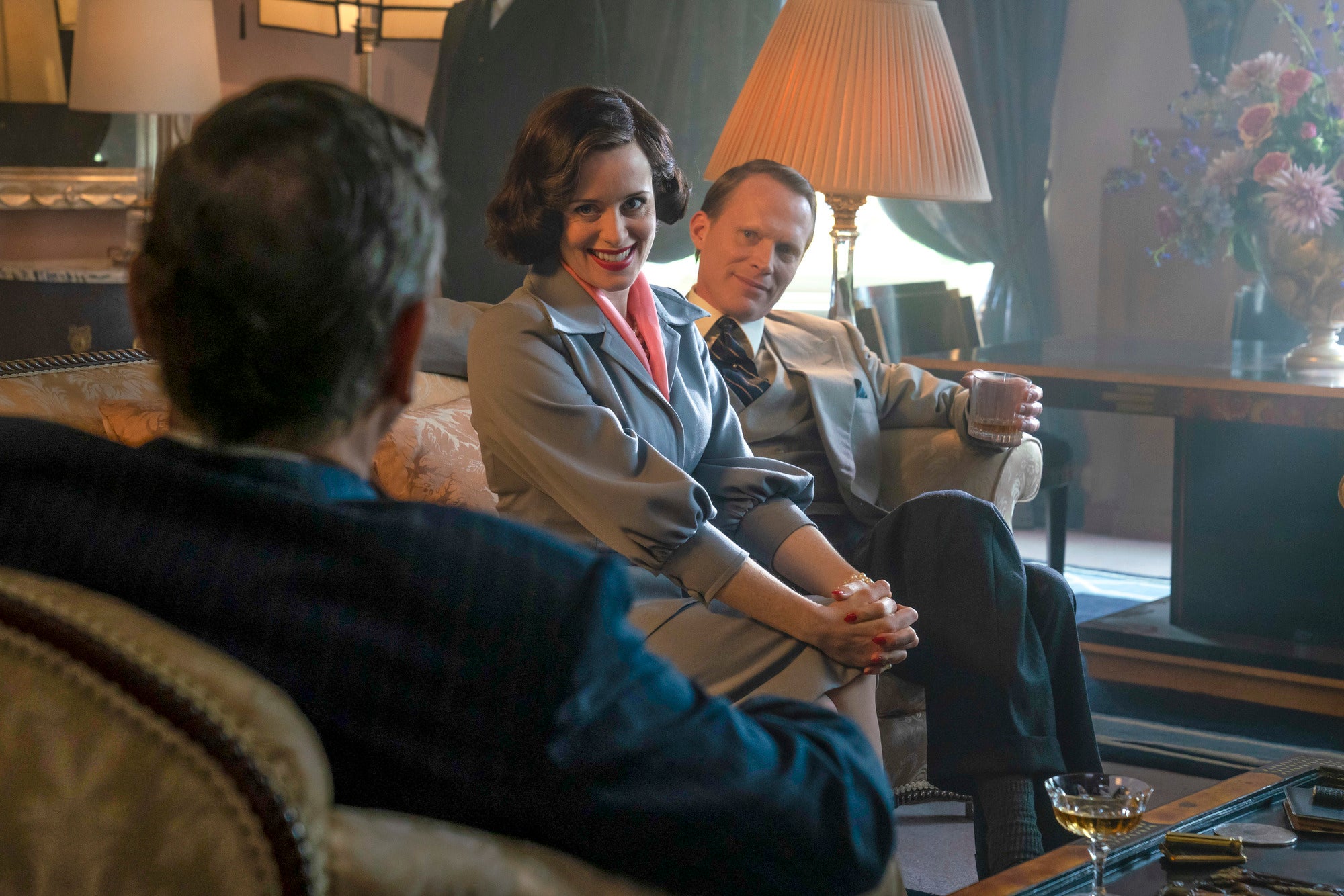A Very British Scandal review: Claire Foy shines in the saddest and most stylish drama this year
Foy and Paul Bettany take on an aristocratic sex scandal that is just as compelling as ‘A Very English Scandal’
Like its spiritual forebear, A Very English Scandal, which dramatised the Jeremy Thorpe affair, A Very British Scandal takes on another aristocratic sex scandal. This time, it’s the case of Margaret, Duchess of Argyll, a society beauty whose divorce from her husband, the Duke of Argyll FKA Ian Campbell, was a tabloid sensation in the 1960s. He accused her of sleeping with more than 88 men, and produced polaroids of her giving a blowjob to an unidentified man, wearing only her pearl necklace. Where the earlier series had Hugh Grant and Ben Whishaw in the leads, here Claire Foy and Paul Bettany play the warring spouses. They are both exceptional, and while the case has fewer moving parts than the Thorpe affair, less political machination, the result is just as compelling.
This series opens in Edinburgh in 1963, when Margaret is about to take the stand. As her car approaches the court, a crowd harangues her. “Slut,” screams one woman, spitting on the window. Inside the building, her estranged husband offers her a last chance to back out of the confrontation. “You’ve played a spirited game,” he says, “but we both know you don’t have the guts for this.” What happens next will see a judge condemn her in high-handed, sexist, deeply unfair language. Guts, she has.
The rest of the first episode focuses on their courtship – the fleeting happy days before the bloom wilted. When they meet on a train, the duke is aristocratic but poor, surrounded by castles he owns but can’t afford to maintain. She is rich upper-middle-class, a famous beauty whose Norman Hartnell wedding dress for her first marriage stopped traffic in Knightsbridge. Both of them are as randy as alley cats. He has been married before, twice, while she has had a string of high-profile dalliances, allegedly beginning with David Niven when she was just 15. In a delicious early scene, after a post-divorce party, Margaret dresses down the society hostess Maureen (Julia Davis, continuing her assault on straight roles), who has just told her she reminds her of a bonobo monkey. “It’s not my fault that you don’t like it, Maureen, and that you’re no good at it. I do like it, I like it very much, and I’m extremely good at it. That’s not my fault.”
The script by Sarah Phelps, she of the excellent Agatha Christie and Dickens adaptations, finds in Margaret a figure out of time, a woman with a 21st-century attitude to sex cursed to be born in an era when nice girls didn’t do that sort of thing. Or at least if they did, it was always under the threat that the patriarchy could come crashing down on you with hypocritical indignation. Foy’s Margaret is brittle but headstrong, unafraid to follow her heart even when it will get her in trouble. Her cold mother Helen (Phoebe Nicholls) shows her no affection, so perhaps it is no surprise she seeks it where she can find it.

Sadly there isn’t much to be had from Ian Campbell, either. I’m not sure Bettany has played such cruelty before, but he takes to it like a natural. He is a charming cad for about 10 minutes before the mask slips, in particular in one excruciating scene as he carries his new wife Margaret across the threshold. She asks him to put her down. He refuses. In her horrified stare we see a woman who has just realised the gravity of her mistake. Phelps has no special affection for the elites; they’re just people with problems. For Campbell, sex and adoration come naturally from his station, but he needs money and, through her father, Margaret can provide it. Margaret, born into a caste that ought to have given her everything she needed, craves what the English in her position have always craved: aristocracy.
For all the ugliness of spirit on display, A Very British Scandal looks gorgeous. This is a co-production with Amazon, so they have the credit card out. The clothes and castles and cars and clubs are rendered in loving detail. Who wouldn’t be obsessed with a lifestyle like this, driving through Glencoe with your new lover in perfect tailoring? I couldn’t keep my eyes off it. I didn’t even mind when Campbell, sitting in his study, etherised and pinned a butterfly into his book while Margaret banged on the locked door. In a less forgiving mood, I’d have found it a bit on the nose. Right at the end of the year, after all the “best of 2021” lists have been and gone, we have a candidate for the most stylish drama of the year. One of the saddest, too.
Join our commenting forum
Join thought-provoking conversations, follow other Independent readers and see their replies
Comments


Bookmark popover
Removed from bookmarks